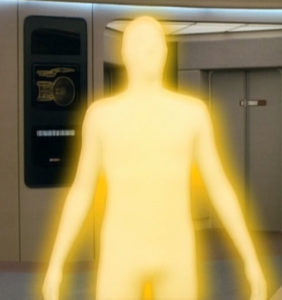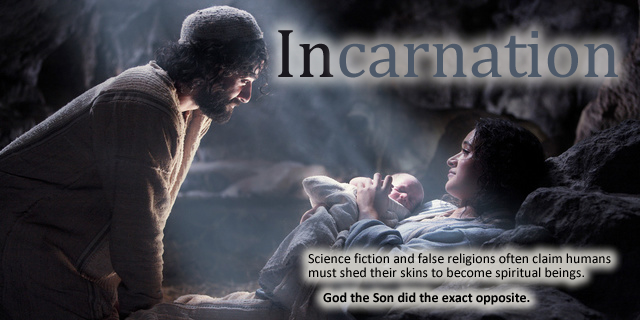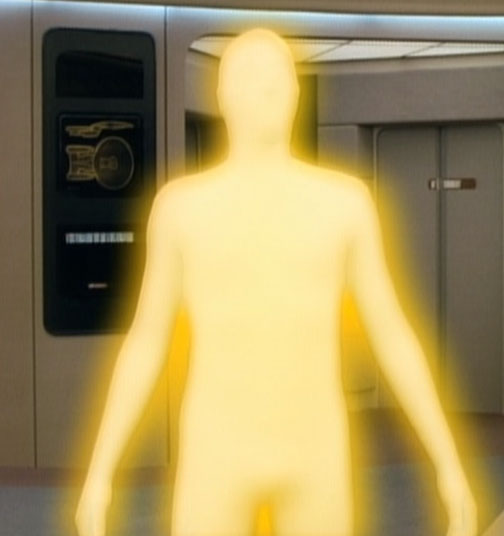Incarnation, Part 1: Eternal Entity
Much of science fiction says humans are swell, but could really use a metaphysical upgrade.
Oh, that zeal for scientific exploration and art is great; that capacity to love, just smashing, but you really should lose the body, boys and girls. Yes. All the body.
This notion could be proved solely from episodes of Star Trek and its sequel series (which I enjoy). Yet I first began seeing this religious notion thanks to a made-for-TV movie whose ending I accidentally saw years ago. I’ve confirmed it is charmingly titled Alien Hunter.
Plot: Bad viruses. Good aliens. An Antarctic research station. Gruesome deaths, and then submarines launch missiles to destroy the whole station. But searching an escape, the two lead characters manage to make telepathic contact with the aliens. Just before the missiles hit, they run outside in the snow, holding hands. They stand beneath the alien ship. It’s a wondrous, hovering mass of spheroid glowing angelic lights. The two vanish into the ship with a rush of beamed-up light, somehow converted into the luminescent beings.
Similarly angelic choirs sing as we later see the ship ascend beyond the planet Earth, and in a blur of vapors it transfers to some extraterrestrial dimension, never to be seen again.
Ha. And they’d think only some Christians believe in a “Rapture.”
Theme: Human beings are good, but far better is to be turned into an Incorporeal Entity.
Or: Earthlings go to heaven, but heaven isn’t for beings who still resemble Earthlings.
In the first Star Trek series, Captain Kirk and crew met wise, above-it-all aliens who had left corporeality for an enlightened bodiless state, such as the Organians. This continued into Star Trek: The Next Generation, perhaps most notably in the episode “Transfigurations.” (Interesting spiritual-sounding title, that.) Spoiler: the crew’s mysterious visitor turns out to be not dangerous, only evolving — once again, from a limited body to an “energy being.”

(From another popular sci-fi series:) “We are humanity two-point-oh.”
This notion originates not in sci-fi, but false religions: that someday, you will upgrade from cramped embodied seats in coach to flying first-class in an incorporeal plane.
Similar stray “memes” even float ghostlike about Christianity. God created the material world, but now He isn’t exactly thrilled about it. That’s why Christians’ future existence will be bodiless. You are destined to cast off the “shell” of your body and free the most valuable part, the soul, into a heavenly incorporeal existence.
Meanwhile, the actual Jesus Christ, God Himself, did the exact opposite.
- False religions and some sci-fi exalts the notion of being “spiritual,” inside and outside. At best that’s a half-truth. But worshiping multiple “spiritual” entities, whether “gods” or forces or highly-evolved aliens, gives it the lie. Only God is eternal, unseen, and Spirit.
- False religions and some sci-fi assumes belief in particles-to-people evolution. (This is not the same as genetic variation within a species, as created by God.) Because all people crave something to worship, many assume a “spiritual” future for men. In C.S. Lewis’s Out of the Silent Planet, Dr. Weston holds this view, and his confrontation with the angelic archon of Mars reveals his true goal: he idolizes a fake notion of “mankind,” but loves no man. By contrast, God makes clear that all people instinctively hate Him.
- False religions and some sci-fi insist man is neutral or good, and it is our world — with its hardships and outdated cultural beliefs — that tempt him to evil (whatever “evil” is). Their solution: transform the world first, and then the soul. That is a reversal of God’s promise. He came first to resurrect people’s souls, then their bodies and all the world.
The Son of God added a new title, “Son of Man” (Daniel 7:13), in no way detracting from His eternal title: “Son of God” (Luke 1:45). God had forbidden people from making an image of Him to worship (Exodus 20: 4-6). Evidently that was His job. He gave an image to His Son.
 Yes, this “firstborn of all creation,” “the image of the invisible God” (Col 1:15), deigned to be the firstborn of a human woman, the image of a visible God. “Though he was in the form of God, [He] did not count equality with God a thing to be grasped, but emptied himself, by taking the form of a servant, being born in the likeness of men” (Philippians 2: 6-7).
Yes, this “firstborn of all creation,” “the image of the invisible God” (Col 1:15), deigned to be the firstborn of a human woman, the image of a visible God. “Though he was in the form of God, [He] did not count equality with God a thing to be grasped, but emptied himself, by taking the form of a servant, being born in the likeness of men” (Philippians 2: 6-7).
That I can’t fathom. It’s wondrous. Magical. How could we explore it? Let’s try, in this series.
I can say more certainly that I find this harder to fathom: the insistence of false religions and some science-fiction stories that it’s best to lose the human body and go energy-being.
Actually, the explanation may be as simple as this:
God said: salvation works this way. Naturally man says: Nuh-uh; another way.
Yet which heroic story is more divine and human?











































This is a fascinating topic, Stephen. I have found this recently to be one of the major themes of my all-time favorite sci-fi series, Stargate: SG-1. The “Ancients,” a race of humans that have “ascended” into pure energy, are the one race that all others seek to emulate. Living for eternity not bound to your physical body and living merely as an all-powerful form of energy appears to be the ideal state of the human soul.
And yet, many, including one of the series’ main characters, finds trouble with this idea. With the “blessing” of ascension, comes a limitation on one’s power: it is against the rules of ascension to influence the world of the humans still remaining below. An ascended being is omnipotent…but not allowed to interfere in humanity’s fate. This leads several of the ascended beings to eventually reject their “blessing” of unlimited power and return back to the human form, even though they must lose that power and immortality they so craved while still humans.
It is a fascinating debate in the series, but I find it disheartening that it focuses so much on “knowing thyself” and “laying down your burden” (ie. the idea that you’re bad and instead recognizing that no, you’re good enough to deserve eternal life, really!). On the other hand, I think the series offers a representation (unbeknownst to them) of Christ’s sacrifice for us. He DID reject his “ascended” state and chose to become human so that, like the characters that reject their ascension and become human again, he could “dwell among us” (John 1:14) and know us intimately, the way only two physical beings can.
The other aspect of this, which gives me shivery feelings, is that, unlike the characters in the show…Christ didn’t just leave his omnipotence behind: He was fully human AND fully God in one body.
Amazing. 🙂
Great article; looking forward to the series!
Thanks, Veronika. Whew, pun unintended, but that storyline about highly evolved humans really takes the religious aspect to a new level. The same with the half-truth, sort-of-allegorical-but-really-just-co-opting truth tendencies I mentioned above. If I were familiar with the Stargate franchise, I would have likely mentioned it here.
And yet as a Man, He evidently had some limitations. That boggles my mind.
Yes, it does… 🙂 In fact, several races even worship the Ancients as forerunners.
It’s sad that there is so much “half-truth,” as you say…part of the reason, however, that I love discussing the topic with Christians because we can see the truths they’re trying to figure out, and bring it full circle! 🙂
To think that Christ chose to give himself limitations as a human is incredible. He knew if he was going to be fully human, he’d have to live in the fallen world as much as any of us. And he still chose to do it. Amazing. There’s no other word for it!
I’m always disappointed when a sci-fi series ends with mankind becoming gods. Gee whiz, people, use some imagination!
Way back in the era of Civilization 2 (the game), they made a space version called Alpha Centauri. If you follow the storyline all the way through, your faction communicates with the planet, which is a living entity in a dreamlike state. Every couple million years it wakes up just as it kills back all of its own neuro network, forcing it back into a dream state. But now that humans have arrived, it can break the cycle of killing itself–by having the humans upload their consciousness into the planet. So at the end, Mankind becomes God in kind of this planetary hive-mind. They can go back into bodies if they want, but they’re still part of the hive mind.
There was another science fiction story I read where mankind basically genetically engineered himself to make copies, then used an alien gadget to replicate these copies all over the universe, basically making himself omnipresent. It nicely circumvented things like monogamy, incidentally, because various copies could get with various other copies of other people.
We just finished playing the Lucasarts adventure game The Dig, about a team of astronauts who get transported to an alien planet and have to do some rough archeology to figure stuff out. The aliens ascended to a bodiless state, can’t get back, and want to come back. At the end the lead alien states that even though they will someday die, they will have lived first. It struck me as such a sad worldview–ascend to another plane to avoid death! Or live life to the fullest because when death comes, you’re wormfood.
Is it just me, or do all these “Ascended beings” stories state that we are only mind, not soul? And if you can keep your mind alive (like the brain in the jar), then you’ll be immortal? Remember the Head in That Hideous Strength. *shudder*
Nope, I think you’re absolutely right, Kerri, now that you mention that. It’s often about trying to capture the essence of a human and keep it alive…but too many people think that our essence if just our mind. They forget about the heart and the emotions, the passion and drive that makes us unique as creatures of flesh – “human.”
I also find strange and rather sad that most often, ascension or salvation or immortality in F&SF is always flawed; people are forever trying to come back to a state of humanity. 😛 Wonder why that is….
It would be like a grub worm ascending to become a human being and then decides he prefers the grub state better. And yet, are we not closer to the grub worm than to God, who became one of us.
*shudders* Mmm…excellent analogy, Bob. How pathetic our view is of God!
Similarly in Trek, some of the near-immortal energy beings — such as Q — are often shown as lacking something that even weaker humans possess. So viewers may see a marriage of seemingly clashing beliefs: that it’s far better to “evolve” into a higher state, but it’s also far better to be a human being ’cause we humans are the greatest.
Some argue that if others had not overruled Roddenberry’s insistence on chest-thumping classical humanism — e.g., Humans are excellent, we explore and we do art and things like that, so you aliens and Commander Data really ought to look up to us — Star Trek: TNG would not be the classic it is today. As it is, the series benefited from the truest parts of classical humanism and the spirituality of cosmic humanism — which took over some episodes, such as “Transfigurations.”
All of it, of course, liberally stole morality from Christianity. So we do no credit to the writers for taking those principles piecemeal; only to God for making them so contagious. No good sci-fi series would work based only on any kind of humanism.
You are so right! I never thought about that before, but even the most humanistic sci-fi series always come back to the conclusion at some point that “someone else” has to be out there, that humanity is not the end-all.
I don’t know…I always find such beings creepy in the extreme. One of the reoccurring enemies in Doctor Who is the Cybermen, beings who attempted to become superior by upgrading their bodies to steel parts and removing emotions. “Becoming creatures of consciousness alone” is part of the Time Lords’ plan in End of Time–with very bad side-effects.
On the other hand, there’s a lot of times aliens try to get bodies by any means, moral and immoral. And one of the sweetest moment in the new series in when the TARDIS is placed in a human body and gets to talk to her thief for the first time.
Yes, I recall being very impressed with this desire shown to be bad.
Do you also recall Screwtape, who had a very high view of the “spiritual,” as demons are, and a revulsion to “earthy” things that are endorsed by the Creator?
Fact is, the hatred of all things physical could be at worst a demonic concept. People may instinctively suspect it as being inhuman — perhaps the only reason the notion persists is because of our sinful nature and susceptibility to demonic notions.
The best stories addressing the issue present these “spirits” as evil and corruptive. One of the best-remember Star Trek: TNG episodes is “Power Play,” in which the crew visits a storm-covered planet — and returns with their bodies taken over, “demon possession”-like, by evil invisible creatures. Star Trek: Deep Space Nine, which more gladly embraced themes of organized religion, readdressed this concept with its later-seasons introduction of the Pah-wraiths — demonic beings who were literally cast out of the Bajoran wormhole, e.g. the “celestial temple.”
This isn’t just in fiction. The idea of Transhumanism tends to be about mankind surpassing their physical bodies in some form or other-cybernetics, life extension, computer consciousness, etc. The desire for eternity is there, but it has to be explained or achieved in purely materialistic terms. Why humans becoming energy beings is any more realistic than them becoming ghosts, you got me.
Transhumanism. Yes, that is the name. There’s humanism at the root, but ultimately it ends up striving for and even venerating that which is not human at all.
Again I’m reminded of Out of the Silent Planet, and managed to find the text:
I LOVE that discussion. It just shows how ridiculous people can be when they use big words instead of being honest.